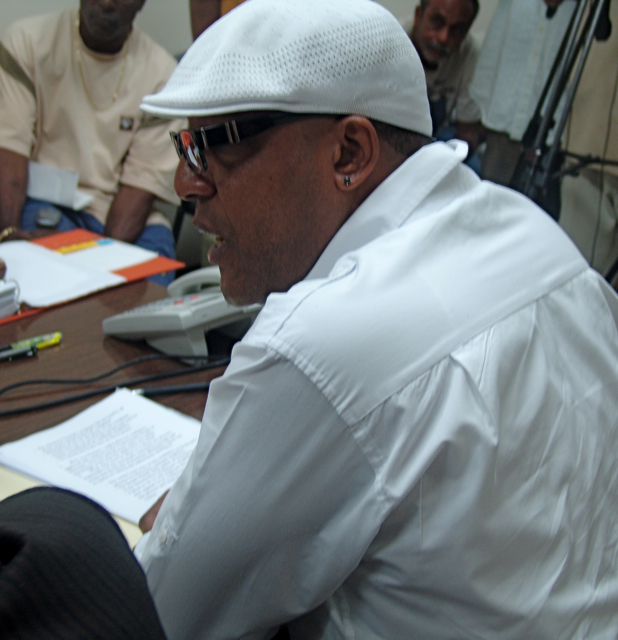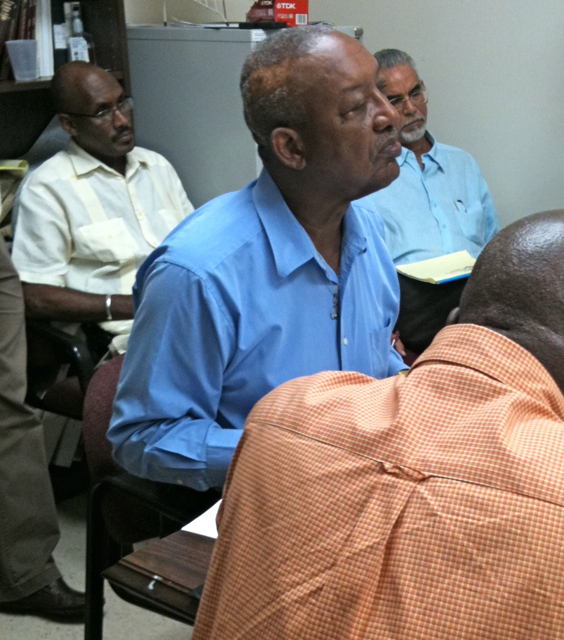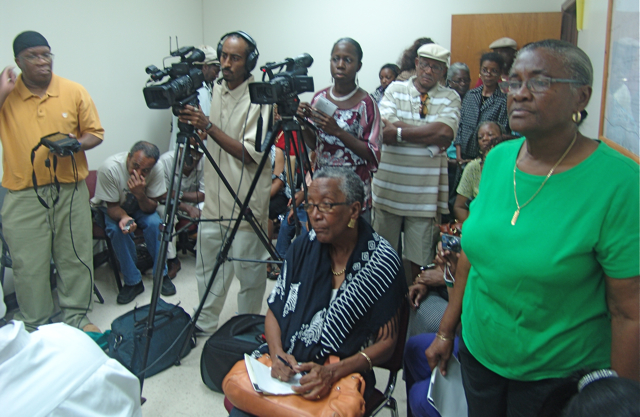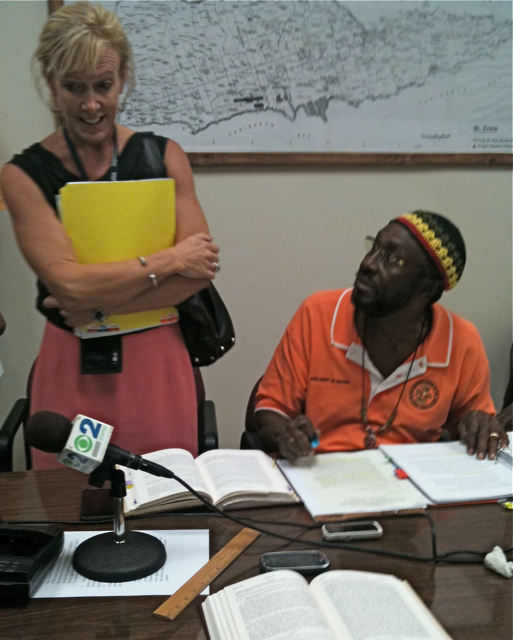Sen. Alicia "Chucky" Hansen was a legitimate candidate who was properly allowed to run for office and legally elected, the St. Croix District Board of Elections decided at a special meeting Thursday.
By a vote of 4-1, with member Adelbert Bryan strenuously objecting and a standing room only audience periodically calling "Shame!" and voicing other complaints, the board rejected the plea of the group Crucians in Focus and its president Michael Springer, who had called for an investigation into how Hansen’s name had gotten on the ballot though she was – as they charged – ineligible.
Many of the audience members who watched angrily gathered outside the meeting afterwards to announce they had filed a petition seeking the recall of Rupert Ross, chairman of the St. Croix District Board of Elections, the first of what they called "a plethora of problems" they hope to address.
Springer filed a letter with the original charges on Oct. 25. According to the complaint, because Hansen was on parole for a conviction of failure to file taxes when she filed to become a candidate for the senate in 2010, she was not eligible.
The Organic Act of 1954 forbids anyone on parole or probation for a felony or for a conviction of a crime of moral turpitude from exercising the right to vote or run for office.
The board asked for an opinion from Attorney General Vincent Frazer, whose reply Monday held that Hansen was qualified. She had been convicted in 2009 on three counts of failure to file taxes, which carries a penalty of not more than one year in prison: Hansen was sentenced to three years on probation.
Frazer pointed out that a felony is classified under the Virgin Islands Code as "a crime or offense which is punishable by imprisonment for more than a year. “Thus," Frazer wrote, "Hansen was convicted of three misdemeanor offenses, not felonies."
The law does not bar those convicted of misdemeanors from voting or running for office.
Frazer also noted that once a candidate has been elected, it is entirely the purview of the Legislature to determine the validity of its membership and, under the separation of powers, neither the courts nor the executive branch can remove a senator.
"Therefore the ultimate question of whether Sen. Hansen is qualified to continue to serve as a senator in the legislature is solely determined by the members of the Legislature," Frazer wrote.

Superintendent of Elections John Abrahamson explained the process which governs candidates filing for office. He said the courts routinely send him lists of residents who have been convicted of felonies, which he checks against the voter rolls. If the convicted person is registered to vote he puts a red dot on the card indicating the person’s right has been limited. When a person files to run for office, he checks their application against the voting records: if the card contains a red dot, he knows the person is not eligible.
"No such order has ever been received in the case of Alicia Hansen," Abrahamson said.
If a citizen believes a person has been allowed to register to vote or run for office improperly, he or she can file an "affidavit of challenge," swearing under penalty of perjury to the cause, Abrahamson continued. Once the election has been certified, those voicing complaint must take the issue to District Court.
Throughout the morning meeting, board member Bryan attempted to cross examine, first Springer, then Abrahamson, and later, Assistant Attorney General Kimberly Salsbury, who was representing the V.I. Department of Justice.
As chairman, Ross would allow Bryan to begin his questions to "clarify the testimony," but each time it became clear the former senator was trying to add issues to the record that had already been determined to be irrelevant or covered sufficiently, Ross cut him off.
"You keep interrupting me," Bryan said at one point.
"It’s my job to interrupt you," Ross replied.
Members Dodson James and Raymond Williams sat stolidly throughout the almost two-hour session, but member Lisa Harris-Moorhead, an attorney, interjected at one point that Bryan was incorrectly citing law. Bryan called her a liar, and aimed other barbs at her during the rest of the meeting, but she did not respond, shaking her head and turning away.
James offered a motion, seconded by Williams, to refer the issue to the Legislature. Ross stepped down from the chair, passing the gavel to Harris-Moorhead, and offered an amendment to the motion – that the board found Hansen had been qualified to vote and run for office. The amendment passed, and then the motion, by a vote of 4-1, with Ross, Harris-Moorhead, James, and Williams voting yes and Bryan objecting, then voting no. Members Ana Davila and Carmen Golden were absent.
Bryan then turned his attention to Salsbury, the attorney from the Department of Justice, asking if anything in the law allowed the board, or the legislature, to overturn the Organic Act or decisions of the U.S. Supreme Court, assuming by his question that that is what the board had done.
Throughout the meeting, the presence of more than two dozen audience members was felt. Ranging in age from senior citizens to a pair of pre-schoolers who sat quietly, the audience filled the small conference room and at least a dozen more spilled out into the hallway.
Bryan occasionally cautioned them to be quiet and, except for some sotto voce grumbling, they were. At one point, another audience member cautioned the vocal members that if they weren’t quiet the chair would clear the room, "and I don’t want to leave, I want to hear this."
Afterwards, a group of about a dozen gathered out front to announce that they had filed a petition to recall Ross.
Speaking for the group, Mary Moorhead said there are a "plethora of problems" that lead to the "perception of corruption" in the territory, and the board of elections is just the starting point for the concerned voters.
"There are problems with GERS, with the LEAC," she said.
The group has 60 days to circulate petitions for Ross’s recall. However, there was disagreement over how many signatures are needed.
The Organic Act of 1954 calls for recall proponents to gather "a list of signatures equal in number to at least 50 percent of the whole number of votes cast for the office in the last general election at which that office was filled."
Proponents argued that that means the number of people who voted for Board of Elections at the last election.
But Abrahamson pointed out that the law says "the whole number of votes cast," not the total number of voters. Because seats on the Board of Elections are voted for at large from a pool of candidates, each voter can cast as many as seven votes. The only way to determine the "whole number of votes," he said, is to add up the number of votes cast for each candidate, whether that person won or lost.

The petition levels five charges against Ross, including misrepresenting election rules and regulations during radio interviews, failing to share all correspondence with all members, and failing to follow due process when addressing complaints against Abrahamson.
Ross said the petitioners have the right to file their petition and he would wait to see whether they gather enough signatures to force a recall.







